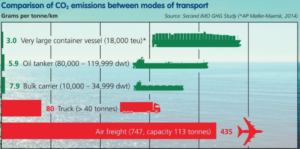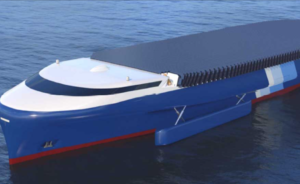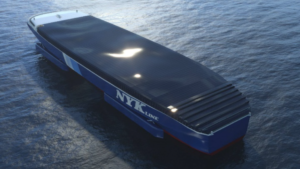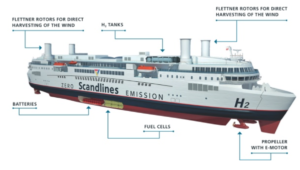The Propulsion Revolution
With the deadline for implementation of IMO 2020 now in the rearview mirror, we are on what might be described as step two of a ten-step ladder to be climbed if shipping is to meet the ambitious IMO targets for 2030 and 2050 which ultimately call for a reduction in total greenhouse gas (GHG) emissions of at least 50% by 2050 compared with 2008 levels while simultaneously pursuing efforts to eliminate emissions entirely.
The adoption by the IMO’s Marine Environment Protection Committee (MEPC) of a phased strategy at its 74th meeting in May 2019 included the development of a pathway of CO2 emissions reduction consistent with the Paris Climate Agreement temperature goals in support of the United Nations’ 2030 Agenda for Sustainable Development. The phased strategy includes:
- Initiation of a further (4th) GHG emissions study by the IMO
- Co-operation with ports to reduce emissions
- Approval of an impact assessment procedure for proposed new measures
- Establishment of a multi-donor GHG trust fund to provide a dedicated source of financial support for technical co-operation and capacity-building activities
- Terms of reference for future inter-sessional working groups in order to expedite their work

comparison of emissions per tonne/km between transportation modes
Addressing the need for significant investment in R&D to move the agenda forward, in December 2019 the leading international shipping associations reached consensus on a proposal to be presented to the IMO detailing the launch of a mechanism to fund a USD 5 billion GHG reduction R&D program, in itself designed to accelerate the introduction of low and zero-carbon technologies and fuels to shipping.
The coalition of shipping associations including BIMCO, Cruise Lines International Association (CLIA), International Chamber of Shipping (ICS), INTERTANKO, INTERCARCGO, INTERFERRY and the World Shipping Council (WSC), is proposing that funding would be collected via a mandatory $2 per/tonne levy on bunker fuel.
Quoting Simon Bennett, Deputy Secretary General International Chamber of Shipping:
“Even using conservative estimates for trade growth, a 50% total cut in CO2 by 2050 can only be achieved by improving carbon efficiency of the world fleet by around 90%. This will only be possible if a large proportion of the fleet is using commercially viable zero-carbon fuels. In practice, if the 50% target is achieved, with a large proportion of the fleet using zero-carbon fuels by 2050, the entire world fleet would also be using these fuels very shortly after, making 100% decarbonisation possible – which is the industry’s goal.”
“USD 2 a tonne will generate about 5 billion dollars over a ten year period – based on total fuel consumption by the world fleet of about 250 million tonnes per year – which we believe should be sufficient to accelerate the intensive R&D effort we need to fully decarbonise our sector within the ambitious timeline agreed by IMO.”
unquote
The coalition proposes the establishment of an “International Maritime Research and Development Board (IMRB)” which would report to a panel of representative IMO Member States to be established by the MEPC having responsibility to provide oversight of its budget and output. The supervisory panel would in turn report back to the MEPC whose next meeting is scheduled for March 2020 when the coalition proposal will be formally considered.
While there are several zero-emission projects under development, the primary challenge is to scale up the production of zero-emission solutions in order for them to have any prospect of being commercially viable for widespread use by the shipping industry.
“The coalition of industry associations behind this proposal are showing true leadership. The shipping industry must reduce its CO2 emissions to meet the ambitious challenge that the International Maritime Organization has set. Innovation is therefore vital if we are to develop the technologies that will power the 4th Propulsion Revolution. This proposal is simple, accountable and deliverable and we hope governments will support this bold move,” said Esben Poulsson, Chairman International Chamber of Shipping.
While the adoption of relatively clean LNG and methanol as transitional fuels for shipping are gaining traction in the cruise, container, auto carrier, ferry and coastal shipping sectors, the deployment of new zero-carbon technologies and propulsion systems to an industrial scale in order to seriously decarbonise shipping will remain the longer term objective. However, make no mistake, this is a monumental challenge, no less than the transition from sail to steam and steam to diesel. New energy sources at an early stage of consideration include hydrogen, ammonia, biomethane, alcohol, bio LNG, fuel cells, batteries and synthetic fuels produced from renewable energy sources.


NYK Super-Eco Ship 2050
The encouraging news is that some shipowners have already tasked their design teams to come up with solutions. As an example, NYK has released a concept design for a zero-emission car carrier in a project named “NYK Super Eco Ship 2050”. The conceptual pure truck and car carrier (PCC) rather than relying on fossil fuels would be powered by solar hydrogen produced from renewable energy sources resulting in zero CO2 emissions. It would also utilise waste heat recovery from fuel cells and further energy saving would be achieved by use of lightweight construction materials, gyro stabilisers and air lubrication of the hull thereby reducing friction. Conventional propellers would be replaced with so called flapping foils that are described as replicating dolphin movements.
The Propulsion Revolution will however require the backing of all industry sectors, not least ports, engine manufacturers and shipyards for all of whom the stakes are equally high. With the average life of a ship being 25 years, many owners will hold back on new orders until there is some clarity on the way ahead. Nobody wants to be stuck with an untradeable asset.
The challenge is huge but as an industry we need to strive for this global climate statement while continuing to power the global economy.


